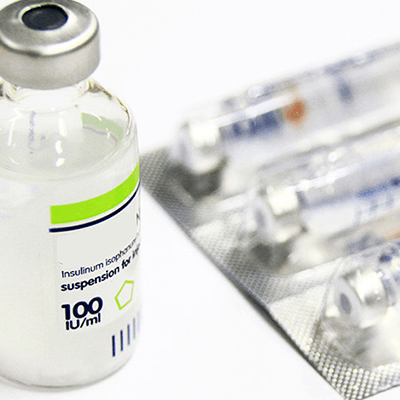Managing Diabetes Complications: High Blood Pressure
High blood pressure, or hypertension, occurs when the force of blood flow inside blood vessels is too high. The heart has to work harder to pump blood through the body, which can contribute to serious health problems. People with diabetes and high blood pressure have nearly twice the risk of heart disease as people who have only high blood pressure. Studies also show an increased risk of kidney damage, diabetic eye disease and stroke when hypertension is a factor.1 Causes of High Blood Pressure According to the Public Health Agency of Canada, about 40% of people with diabetes also have high blood...
Read MoreWhat is A1C?
Your A1C number Consider your A1C number (also known as HbA1c or glycated hemoglobin) as a snapshot of your blood glucose levels over several months. Over time, glucose naturally attaches itself to your blood cells. When this happens, the cell is considered “glycated.” The more glucose in your blood, the more glycated A1C cells you have. What’s an optimal A1C number? The recommended A1C target for a person with diabetes is 7% or lower—some people remember this figure as “lucky number 7.” However, while your A1C number gives you and your doctor an idea of how your diabetes is being...
Read MoreSimple tool to understand your results
The Accu-Chek® 360° Testing in Pairs Tool- a simple, 7-day paper tool See how the things you do affect your blood glucose Accu-Chek 360° Testing in Pairs is a simple tool that helps you track your blood glucose before and after a specific meal, exercise or other event. Use it when you want to focus on just one thing in your daily eating habits or routine. For just 7 days, see how the things you do affect your blood glucose and what works for you. Food/Drinks....
Read MoreTips for Making Testing Easier
Whether you check your blood glucose level once a week, once a day, or 6 times a day, learning how to make testing easy and less painful may inspire you to test more often. For people with diabetes, the knowledge that you gain from testing is the key to staying in control of your health. It helps you make informed decisions about medicine, food, and exercise. It helps you cope with the day-to-day demands of living with diabetes, you’ll feel better each day, and you’ll lower your risk for future diabetes complications.1 Here are some tips for getting the best results possible. A guide...
Read MoreInsulin Injections: Breaking Down The Barrier
If insulin injections are part of your daily life, you know how essential they are to managing your diabetes and preventing complications. You also know that following your injection schedule is crucial. If your body doesn’t get enough insulin over the long term, you risk developing serious problems with your eyes, heart, nerves and kidneys. Getting too much insulin could lead to hypoglycemia—extreme cases of which can cause diabetic coma. Despite all this, according to a study conducted in the US, over half of people with insulin-dependent diabetes have deliberately skipped injections at some point. Around 20% do it...
Read MorePractice #GlucoVigilance during these times to be in range
Background: The current times are beyond anything we have ever experienced. During these unprecedented times, we all should put our health on priority and exercise caution. Even more so, if one has diabetes. People with uncontrolled diabetes are at a higher risk, due to lower immune response.1,2 WHO has raised an advisory and has suggested that patients with chronic ailments like cardiovascular diseases, diabetes, hypertension, chronic respiratory diseases and cancer are more prone to severe illnesses as compared to others during these times.3 Hence, it is extremely important for...
Read MoreLiving in Range
Feeling your best—life in your target range When you find your mind wandering—thinking about the future—what do you see? Whether you dream about taking photos somewhere amazing or starting a family, or you'd simply like to have more energy or sleep through the night, keeping your blood glucose in line can help you achieve it. Sometimes it can seem like diabetes is all about the numbers. But your efforts to stay within your target ranges for blood glucose before and after meals, as well as meeting your HbA1c goal, are really about feeling your best today and for years to come ...
Read MoreGet a Good Night’s Sleep
Why sleep is important for people with diabetes When you are getting enough sleep, you may find that you have an easier time controlling your blood sugar. You’ll be more alert during the day, have more energy, less stress, and an overall better mindset for monitoring and managing your diabetes. Consider what happens when you don’t get enough sleep. In addition to other things that may interfere with your sleep like schedule changes or stress, people with diabetes can have potential complications with sleep. Both high and low blood sugar levels can interrupt your sleep. People with type 2 diabetes who don’t get a good...
Read MoreTurning a Down Day Around
Turning a Down Day Around Everyone with diabetes has good and bad days, days with in-range blood sugar levels and days when things just don’t work out right. When the bad day seems to be taking over, here’s how to turn it around. Perspective is everything Change your mind, change your life. When you look at your diabetes as something you can effect, as an opportunity to learn about your own health, you’ve already taken the most important step to a better day and a healthier life. Don’t forget to laugh! Humor helps you see everyday things from a new perspective. That’...
Read MorePages
What is A1C?
Your A1C number Consider your A1C number (also known as HbA1c or glycated hemoglobin) as a snapshot of your blood glucose levels over several months. Over time, glucose naturally attaches itself to your blood cells. When this happens, the cell is considered “glycated.” The more glucose in your blood, the more glycated A1C cells you have. What’s an optimal A1C number? The recommended A1C target for a person with diabetes is 7% or lower—some people remember this figure as “lucky number 7.” However, while your A1C number gives you and your doctor an idea of how your diabetes is being...
Read MoreSimple tool to understand your results
The Accu-Chek® 360° Testing in Pairs Tool- a simple, 7-day paper tool See how the things you do affect your blood glucose Accu-Chek 360° Testing in Pairs is a simple tool that helps you track your blood glucose before and after a specific meal, exercise or other event. Use it when you want to focus on just one thing in your daily eating habits or routine. For just 7 days, see how the things you do affect your blood glucose and what works for you. Food/Drinks....
Read MoreTips for Making Testing Easier
Whether you check your blood glucose level once a week, once a day, or 6 times a day, learning how to make testing easy and less painful may inspire you to test more often. For people with diabetes, the knowledge that you gain from testing is the key to staying in control of your health. It helps you make informed decisions about medicine, food, and exercise. It helps you cope with the day-to-day demands of living with diabetes, you’ll feel better each day, and you’ll lower your risk for future diabetes complications.1 Here are some tips for getting the best results possible. A guide...
Read MoreInsulin Injections: Breaking Down The Barrier
If insulin injections are part of your daily life, you know how essential they are to managing your diabetes and preventing complications. You also know that following your injection schedule is crucial. If your body doesn’t get enough insulin over the long term, you risk developing serious problems with your eyes, heart, nerves and kidneys. Getting too much insulin could lead to hypoglycemia—extreme cases of which can cause diabetic coma. Despite all this, according to a study conducted in the US, over half of people with insulin-dependent diabetes have deliberately skipped injections at some point. Around 20% do it...
Read MorePractice #GlucoVigilance during these times to be in range
Background: The current times are beyond anything we have ever experienced. During these unprecedented times, we all should put our health on priority and exercise caution. Even more so, if one has diabetes. People with uncontrolled diabetes are at a higher risk, due to lower immune response.1,2 WHO has raised an advisory and has suggested that patients with chronic ailments like cardiovascular diseases, diabetes, hypertension, chronic respiratory diseases and cancer are more prone to severe illnesses as compared to others during these times.3 Hence, it is extremely important for...
Read MoreLiving in Range
Feeling your best—life in your target range When you find your mind wandering—thinking about the future—what do you see? Whether you dream about taking photos somewhere amazing or starting a family, or you'd simply like to have more energy or sleep through the night, keeping your blood glucose in line can help you achieve it. Sometimes it can seem like diabetes is all about the numbers. But your efforts to stay within your target ranges for blood glucose before and after meals, as well as meeting your HbA1c goal, are really about feeling your best today and for years to come ...
Read MoreGet a Good Night’s Sleep
Why sleep is important for people with diabetes When you are getting enough sleep, you may find that you have an easier time controlling your blood sugar. You’ll be more alert during the day, have more energy, less stress, and an overall better mindset for monitoring and managing your diabetes. Consider what happens when you don’t get enough sleep. In addition to other things that may interfere with your sleep like schedule changes or stress, people with diabetes can have potential complications with sleep. Both high and low blood sugar levels can interrupt your sleep. People with type 2 diabetes who don’t get a good...
Read MoreTurning a Down Day Around
Turning a Down Day Around Everyone with diabetes has good and bad days, days with in-range blood sugar levels and days when things just don’t work out right. When the bad day seems to be taking over, here’s how to turn it around. Perspective is everything Change your mind, change your life. When you look at your diabetes as something you can effect, as an opportunity to learn about your own health, you’ve already taken the most important step to a better day and a healthier life. Don’t forget to laugh! Humor helps you see everyday things from a new perspective. That’...
Read More








